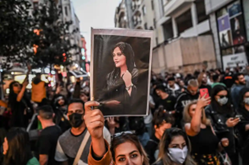The West's Hypocrisy Regarding the Iranian Protest

By Hiba Ul-Hasan (BA History) and, Unzeela Manzoor (BA Politics and International Relations)
Hiba: It would seem evident that, given the circumstances of her killing, and Iranian laws that violate UN human rights rules, there should be a focus on condemning and holding the Iranian regime responsible?
The news outlets did first focus on the barbaric means used by the Iranian government to enforce its ‘rules,’ especially because the protests triggered by this event resulted in greater violence by the police against peaceful protestors. Various videos circulated on social media depicting the nature of the protest in which Iranian women and girls took to the streets in solidarity with Maha, resulting in widespread international support. Other than these marches and a few news pieces, little international governmental action has been taken against the Iranian regime.
The protests in Iran were taking place before international coverage. However, due to the influence of social media, news of Maha’s death and the protests in Iran reached the international community faster. Iranian women living across the world are sharing stories and experiences of their sisters living in Iran. This is due to the Iranian censorship of social media that came about after videos circled of women cutting their hair, and burning pieces of fabric during protests. University students and girls have also been at the forefront of the protest despite knowing the risks they are taking for opposing the government.
For Iranian women, this dress code is a prevalent part of their daily lives. They live in fear of being taken into custody by the Morality police and having a similarly unfortunate fate as Maha, like many others who have been subjected to the police’s violence. They should, like all women around the world, be able to have the freedom to dress how they want. Whether that means wearing a hijab and dressing modestly or not. Women should be able to do either of these things without fear that they will be discriminated against, mocked or subjected to violence. Every individual has the right and freedom to dress how they see fit without anyone else imposing their opinion.
Unzeela: Recently, there have been international waves of solidarity starting to pour in. Videos of women from around the world chopping their hair have been surfacing on social media. This was meant to be a means of ‘reclamation’ and a symbol of ‘rebellion’, which is both moving and powerful. With Oscar-winning actresses joining in on the initiative, this trend has made headlines and, subsequently, so has its cause. While it is pertinent to draw as much attention as we can to the matter, it is important to gauge our own positionality before we partake in acts of solidarity.
What is absurd is that these activists reign from Europe, particularly France and Israel.
The policies of both countries are rooted in islamophobia and target Muslim Women who wear the Hijab. This adds a layer of hypocrisy and performative-ness to the act. What doubles down on this is the ‘minute of silence’ observed by French MPs in the national assembly in remembrance of the Iranians who lost their lives. As if it was not the same MPs who passed the law banning the Hijab in schools in the French assembly last year.
“The international community must play an important role in advancing the Iranian revolution rather than hijacking it”
The protests in Iran are for liberty and choice. That choice extends to women who do not want to wear the Hijab. Empty shows of support from nations and, activists who are robbing Muslim women of the same choice in their own backyards, does nothing for the movement. Instead, it takes space away from the voices that should be at the forefront. The international community must play an important role in advancing the Iranian revolution rather than hijacking it.
Photo Caption: A protester holds a portrait of Mahsa Amini- Ozan (Credit: Köse/AFP/Getty Images)



